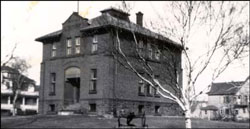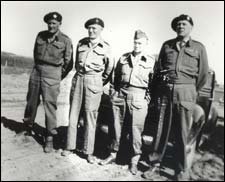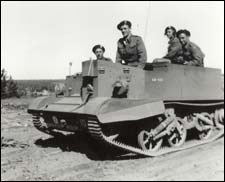 The men signed up with the local unit - B Squadron of the 17th (Reserve) Armoured Regiment. As part of the PEI Light Horse, the unit had been formed in 1903 and also recruited for the active army. Captain Robert L. Mollison (MM) was commander of B Squadron. Uniforms and equipment were issued at the Armouries on 14 April and the first parade was held in Montgomery Hall 21 April 1942.
The men signed up with the local unit - B Squadron of the 17th (Reserve) Armoured Regiment. As part of the PEI Light Horse, the unit had been formed in 1903 and also recruited for the active army. Captain Robert L. Mollison (MM) was commander of B Squadron. Uniforms and equipment were issued at the Armouries on 14 April and the first parade was held in Montgomery Hall 21 April 1942.Squadrons A-E reported to the Beach Grove army compound in Charlottetown for a two-week summer course under Lieut-Colonel G. Elliott Full. The training for B Squadron continued in the fall with weekly sessions at the Summerside Armouries. Sergeant Major Gerald Major and Major D. F. Tierney gave instruction. In February 1943, the non-commissioned officers of the 17th Reserve took examinations at the local armoury. The Journal commented about the "splendid spirits" of the men.
Within a few months, more men were sought because many members had joined the active army or had gone into war industries. A large public rally in Memorial Square on 1 June 1943 was planned in order to attract seventy-five local men to bring the Squadron up to strength. The campaign was part of Reserve Army Week, which was recognized in the press with numerous articles. A local editorial extolled the value of the Reserve Army and the importance of the campaign.
The results were disappointing. On 8 June forty men were still needed. A call was put out for older men, the top age limit for the Reserve Army being fifty years. The training was portrayed as an exciting experience in an article about two Universal Carriers from Charlottetown being used by the local unit. "Trips are made out of town in them and they are put through some lively paces."
The danger of this training was realized in September 1944 when three members of the 17th Reserve were killed. The Bren gun carrier in which they were travelling toppled over a bridge at Coleman Corner in western PEI.
 In July 1943, Capt. Mollison (MM) of Summerside accepted a promotion to Lieut-Colonel and took over command of the Prince Edward Island Light Horse. He was a veteran of World War I and held many prominent positions in the province. The command of B Squadron then became the responsibility of Lt S. G. Merriam, who was manager of the Royal Bank in Summerside.
In July 1943, Capt. Mollison (MM) of Summerside accepted a promotion to Lieut-Colonel and took over command of the Prince Edward Island Light Horse. He was a veteran of World War I and held many prominent positions in the province. The command of B Squadron then became the responsibility of Lt S. G. Merriam, who was manager of the Royal Bank in Summerside.The federal government acknowledged the value of the Home Guard Reserve Army when it announced in December 1944 that it would have a continuing role in the country after the war ended.
 In July 1946 the Light Horse disbanded and the officers, with Lieut-Col Mollison presiding, held their final regimental dinner at the Charlottetown Hotel. The members then amalgamated with the PEI Highlanders to form The Prince Edward Island Regiment 17th Armored Reconnaissance Regiment.
In July 1946 the Light Horse disbanded and the officers, with Lieut-Col Mollison presiding, held their final regimental dinner at the Charlottetown Hotel. The members then amalgamated with the PEI Highlanders to form The Prince Edward Island Regiment 17th Armored Reconnaissance Regiment.| Related Articles | Related Images | Related Memories | Related Websites | Inflation Calculator |
| Home Page | Site Map | Contact Us | Wyatt Heritage Properties |







